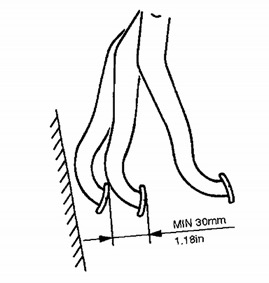OtterSpring1.2-Clutching

We start with the motor off, playing through shifting scenarios, intending to start imprinting that invisible gear arrangement schematic. After sixty years of stick shift driving, that pattern remains a minor mystery to me, and this blind spot becomes obvious as I set to failing to explain it. While each gear holds a specific position, finding that position relies upon more intuition, more feel, than I can explain. I realize that I have never felt completey confident I've found a gear until that gear engages.
A small complication blocks the start of actual driving practice, the key won't turn in the ignition. I call Mike the Mechanic to ask why that that might happen. "Well, if the clutch isn't completely depressed…" I excuse myself to try, try it again, and after some wrangling, it turns over. The ignition seems sticky, though. I return to the call and agree to drop by the shop the next day. A switch might need replacing. Then back to the lesson.
The Otter manages to start the car (no need to keep grinding the ignition once the engine starts running) and even backs down the driveway, though backing down requires less clutch control that driving up, as we soon discover. She's doing just fine, well within the normal responses to that first encounter with the dreaded clutch. Engine dies, try again. Then again. A bit of the old humpety-hump, engine dies, car starts drifting backwards down the driveway. Also completely normal.
Our first lesson ends after a series of failed attempts, culminating in actual forward movement, perhaps a yard's worth, but definite progress.
Later, I drive us down the hill, explaining what I'm doing all the way, and I feel surprised at how much mindfulness it requires for me to explain what I usually accomplish without thinking at all about any of it. I explain that driving a stick seems so impossible to learn because it's one of those skills that one can only properly deploy if not thinking about it. Any thinking at all amounts to over-thinking. The ability resides in that thin space between pre- and fully conscious where thinking cannot tread. Every explanation fails to describe anything, perhaps because driving a stick shift relies upon feeling, not thinking. How might I teach someone to laugh? Or cry? Teaching someone to drive presents exactly this dilemma.
We will practice more today, for only exposure to the dilemma could ever provide the context within which it might resolve itself. And it
will resolve itself once the overwhelmingly complex choreography sorts itself out, which it will. Eventually. The exact process by which that resolution might happen will remain a mystery, unexplainable, until just before it no longer seems to need explaining anymore. This seems no different from learning many, perhaps most activities. Our explanations can't help but come in metaphorical imprecision. Our actual actions require great if ultimately indescribable precision.Nobody teaches and nobody, it seems to me, ever really learns. Perhaps assimilation better describes the experience. We intend, we engage, we practice, then we might master, with no real learning ever occurring. I'm pleased to serve as witness and reassurer during this transformation which we intend to unfetter an innate ability into one she can reliably employ without really knowing how she does it. Knowing how doesn't cut much, and never did. The most important and reliable abilities, we deploy without really knowing how we do that. Learning, in this perhaps most common of all contexts, depends more upon losing that stifling self-consciousness inhibiting genuine skill.
I agreed to teach The Otter how to drive a stick shift, understanding just how paradoxical her request would inevitably become. I drive a stick shift, but it does not follow that I know how to drive one, for perhaps nowhere does the knowing-doing dichotomy come into sharper focus than when the old hand agrees to teach the youthfully innocent. Both bring more unknowing into the exchange than accumulated knowledge. She doesn't yet know what she was born capable of doing while I presume I know and therefore can teach something I never really learned. In the process of teaching and learning we rediscover that we cannot teach and cannot learn, then we both assimilate something again. In exactly this manner, we pass our heritages on to the next generation. We know no other way than clutching at these imaginary straws until we finally grasp something.
©2016 by David A. Schmaltz - all rights reserved


